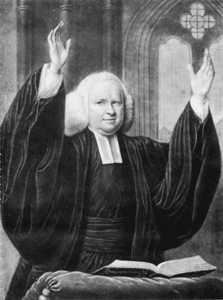 Paul Johnson, the author of A History of the American People, writes: "[T]here was a spiritual event in the first half of the 18th century in America, and it proved to be of vast significance, both in religion and in politics." He is writing about the Great Awakening, a religious revival started by impassioned preachers determined to bring as many souls as possible to the saving Grace of Jesus Christ.
Paul Johnson, the author of A History of the American People, writes: "[T]here was a spiritual event in the first half of the 18th century in America, and it proved to be of vast significance, both in religion and in politics." He is writing about the Great Awakening, a religious revival started by impassioned preachers determined to bring as many souls as possible to the saving Grace of Jesus Christ.
By the early 18th century, through hard work, a prosperous seagoing trade, and practical inventiveness, the colonies had grown rich and the churches in the cities had become respectable and stale. And that is why the revival started away from the cities in the country among the German immigrants. In 1719, Theodore Frelinghuysen, a pastor of the Dutch Reformed Church, led a series of revival meetings in the Raritan Valley in which he stressed the need for Bible study among the people.
In Neshaminy, Pennsylvania, William Tennent (1673-1745) built his Log College, a primitive rural academy that taught basic academics as well as religion. Frontier religion consisted of rhetorical fireworks and enthusiastic hymn-singing, quite unlike the staid services in the respectable churches of Boston and Philadelphia.
In Massachusetts, it was the intellectual Jonathan Edwards (1703-58) who spurred the revival in New England where religious liberalism was dampening the old Calvinist spirit. His sermon, "Sinners in the Hands of an Angry God," was read throughout the colonies and memorized by many lesser evangelists who wanted to melt hardened hearts. In his discourse, "God Glorified in the Work of Redemption," he asserted that the happiness human beings find in the "Glorious Excellences and Beauty of God" is the greatest earthly pleasures as well as a spiritual transformation.
But perhaps the greatest and most effective of the Awakening preachers was George Whitefield (1714-70), who came to America from England "to blow up the Divine Fire lately kindled." He preached to huge crowds in the open air and converted thousands of souls.
The Awakening also spurred the founding of such great institutions of learning as Dartmouth College in New Hampshire, King's College in New York, which later became Columbia, and the College of New Jersey, which became Princeton. Thus the religious revival also emphasized the need for learning and inspired a vision of the future in which, Edwards said, "God shall take the kingdom." Paul Johnson writes:
The Great Awakening was thus the proto-revolutionary event, the formative moment in American history, preceding the political drive for independence and making it possible....It was the marriage between the rationalism of the American elites touched by the Enlightenment with the spirit of the Great Awakening among the masses which enabled the popular enthusiasm thus aroused to be channeled into the political aims of the revolution....Neither force could have succeeded without the other.
And that is why the Christian religion has been such an integral part of the American psyche, from colonial times to the present. Without that spiritual component, America would not be America. And that is why the humanists and atheists will never succeed in separating America from its religion. Christianity is the bedrock of our basic culture no matter what Hollywood and the liberal media may do to negate that fact.
Thus, the Great Awakening is a subject that homeschoolers should study in depth because it will teach them the significance of Christianity in our past and its continued significance in our future. Read the sermons of Jonathan Edwards and George Whitefield and discover the power that galvanized the thirteen colonies into a single union that permitted them to wage a most difficult War of Independence against the mightiest military power on earth.
In back of the Declaration of Independence was the Word of God inscribed in the hearts of the colonists who would be free. As Paul Johnson said, neither force could have succeeded without the other.